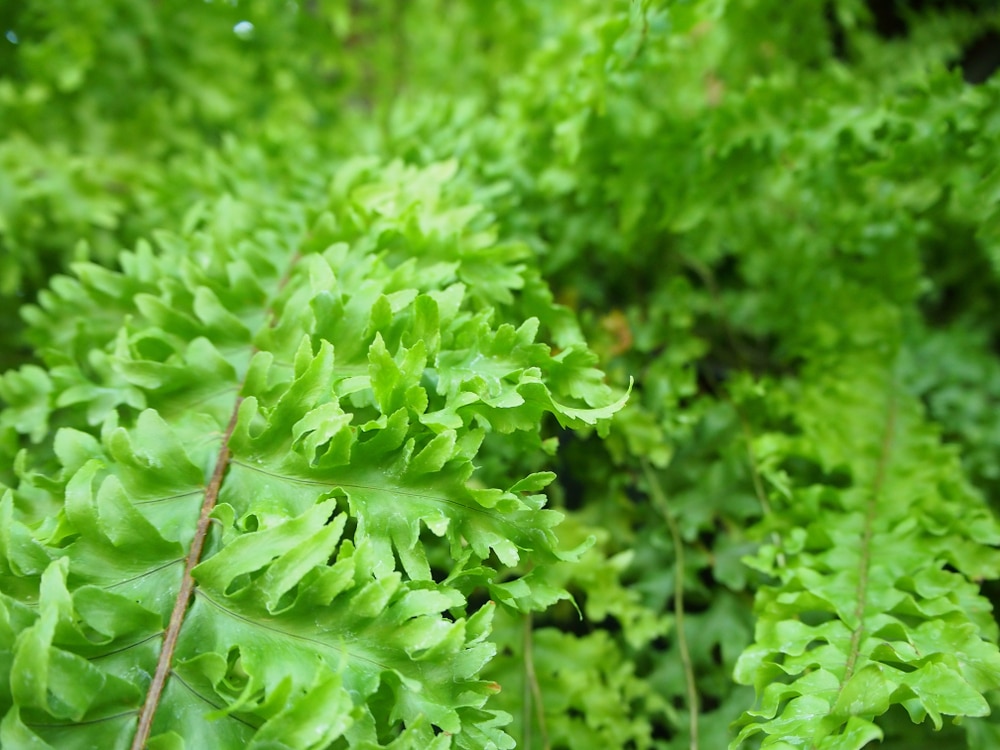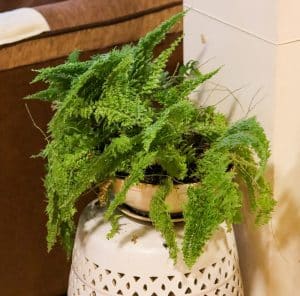Lush and fluffy, the cotton candy fern is a low-maintenance houseplant that looks like a puff of green cotton candy.

| Botanical Name | Nephrolepsis exaltata |
| Common Name | Cotton Candy fern, Fluffy Ruffle fern, Suzy Wong fern |
| Plant Type | Perennial |
| Flower Color | Vibrant green, fluffy frond that spreads outward as it grows |
| Size When Mature | 24”-36” |
| Bloom Time | Non-blooming |
| Sun Requirements | Partial Sun |
| USDA Hardiness Zones | 9-11 |
| Soil PH Range | 6-6.5 |
| Soil Type | High organic matter, loose, well-draining, moist, acidic |
| Water Needs | Medium |
| Native Area | Tropical regions throughout the world |
What You Need To Know About Cotton Candy Ferns
The Cotton Candy fern or Nephrolepis exaltata is a sword fern native to swamps and tropical forests. They can be grown outdoors in large containers or indoors in hanging baskets. The Cotton Candy fern spreads outwards with soft, fine fronds as it grows.
The Cotton Candy fern is non-toxic and pet-safe.
How To Care for the Cotton Candy Fern
Here’s everything you need to know about growing and caring for a thriving Cotton Candy fern.
Light
While the Cotton Candy fern can tolerate shade, it does best with partial or indirect sunlight. Place somewhere that gets early sun, but where it has access to shade in the afternoon when the sun is at its highest and temperatures are at their hottest.
Cotton Candy ferns need moisture, so direct sunlight that can evaporate the water in the soil and dry the plant should be avoided for a healthy plant. Direct sunlight can also scorch the foliage.
If kept near a window that gets direct sunlight in the afternoon, it is best to move the Cotton Candy fern to the shade during those hours or use sheer curtains or blinds to filter the light.
Water and Soil Needs
The Cotton Candy fern does best with well-draining, loose soil. They prefer organic content in the soil, such as peat or coconut peat. It is crucial to keep a balanced acidic soil of around pH 6-6.5.
Peat moss is an excellent soil alternative for the Cotton Candy fern, as it has the organic content it craves for healthy growth and allows for the high humidity content it needs.
Avoid dry soil at all costs. If the Cotton Candy fern’s soil is too dry for too long, the fronds will begin to turn yellow, and it could perish. While it is a relatively easy plant to care for, soil moisture is critical.
Use a pebble tray or a sprayer to ensure moisture of the soil. Be careful when spraying, though, as water can get trapped in the fronds and cause damage to the fern. The soil should stay moist but not wet. Drooping can be caused either by overwatering or underwatering.
Temperature Requirements
Cotton Candy ferns do best in zones 9-11 of the USDA’s hardiness zones. They prefer mild temperatures from 60° to 80°. Anything above 95° will burn the fern, and anything below 35° will hold back its growth.
Fertilizer
The best fertilizer to use on a Cotton Candy fern is a liquid fertilizer at half strength. They don’t love fertilizer, so you want to try to prevent inorganic buildup on the topsoil.
Fertilize every four weeks from April through September.
Common Diseases
Ferns kept indoors are susceptible to blight. Bacterial blight causes translucent spots across the leaves that increase in size and darken in color to brown, ringed with purple. Bacterial blight can be controlled by ensuring the fronds stay dry and discarding any infected plants.
Rhizoctonia blight causes brown spots on leaves. The spots spread rapidly, and a fungus forms between the fronds. This blight can be managed with pasteurized potting soil or a foliar fungicide.
Cotton Candy ferns, like other ferns, are also vulnerable to nematodes which attack the leaves and roots of the ferns. Again, keeping the fronds dry is the best way to prevent this issue.
Cotton Candy Fern Propagation
Propagation through the spores is possible with the Cotton Candy fern. It involves collecting and then preparing spores in a mixture of pean and vermiculite and hoping they grow fronds.
However, the best, easiest way to propagate the Cotton Candy fern is simple with rhizome division. Just cut off some fronds with rhizomes and plant them in a new pot.
You may also like to find out about essential oils to keep birds from building nests.

